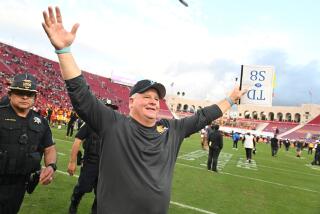Shell Puts a Team With No Home Back in Familiar Territory
- Share via
Coaching the Raiders requires a gift for detachment.
The coach must, to begin with, detach himself from the litigations pervading the everyday life of the Raiders.
He must detach himself from contract problems involving the help, leaving these matters to a higher god.
And where the team will be located is an issue with which he can’t be concerned, either.
If there is a final detachment connected with his job, it would be in the area of that style of football the Raiders choose to play.
That decision, too, rests with a higher god.
Little wonder Art Shell is delighted with his position as head coach of the Raiders, who have just landed in London for an exhibition next Sunday with the New Orleans Saints.
Art’s mind needn’t be clouded with detail.
“I pay attention to injuries and to what happens on the field,” Art says. “It is my job only to implement Raider football as we have known it over the years.”
Until recently, Raider football was known for something not prevalent today. It was wins.
Seeking to rectify this distressing problem, management changed coaches in 1988, bringing in a young gentleman from Denver named Mike Shanahan.
Erring in his belief that the Raiders belonged to him, he changed the offensive concept. He changed team rules; a Raider, for instance, no longer could grace the sideline sitting on his helmet.
He also changed the coaching staff, attempting at one point to fire nine assistants. That represented a lot of assistants, considering the staff consisted of 11.
Among those recommended for dismissal was Shell, an offensive line coach.
In the end, Shanahan was permitted the luxury of four firings, after which ownership fired Shanahan, replacing him with Shell after the fourth game last year.
Much of the offense introduced by Shanahan went out the door with him, the Raiders returning to the type of game they embraced through their happier years.
“Will you resort to the short passing game so popular today in the NFL?” Shell was asked.
“Generally,” he answered, “our policy will be to look deep first and look short second. We favor what is called the horizontal game. We did an awful lot of winning with it.”
The horizontal game, of course, is the longtime choice of the team operator, Al Davis, who will tolerate change in the system, but not upheaval.
Thinking upheaval, Shanahan came to his finish. Shell will be more discreet.
Talking privately to Raider players about their coach, you get the feeling they like him in ways not related to tactics.
“Having played for as long as he did (15 years),” says one, “he has a good understanding of guys’ problems. And one of his best qualities is that he isn’t petty. He pays attention only to important things. He doesn’t pick at players and impose a lot of . . . rules.”
In the 12 games he coached last year, Shell won seven, handicapped throughout the season with player injuries. Coaching a total of 20 games with the Raiders, his predecessor, Shanahan, won only eight, leading to his departure.
If he had done more winning, the changes he tried to introduce might have been acceptable. But ripping up an organization, and losing, is a combination few are able to survive.
Shell feels blessed not having to deal with contract problems involving his forces.
“When I came into pro football,” he recalls, “my agent was my college president at Maryland State. He sat down with Al Davis and negotiated my initial contract. He asked no fee. Thereafter, I never had an agent, even when I became All-Pro.”
“Do you feel you were shorted?” he was asked.
“Not at all. I probably did better than I should have. I would say to Al Davis, ‘Al, you’re my agent. You deal with yourself as if I were your client.’ I always got what was coming to me. And I had far fewer headaches than players have today.”
Art thought about this for a moment, then continued:
“A lot of agents create unhappiness among their players by making them believe they are worth more money than they ever will get. They are working on the players’ egos.
“Well, they don’t get the money the agents have suggested and they feel cheated. I never had the grief that players experience today.”
“Is it upsetting to you and your players not knowing whether the Raiders will be playing in L.A. next year, or even this year?”
“I own a home here (in Palos Verdes) and I have children in school,” he answered, “but those problems are standard in professional sports, as well as other businesses. If your company moves, you move with it. You survive, especially if you have a good job. I think the players are a little uneasy over their team’s status, but not uneasy enough to play bad football. If we lose, in other words, we can’t blame it on the moving plans of the club.”
Encamped in London, where they will meet the Saints at Wembley Stadium, the Raiders have brought over their dancing troupe, the Raiderettes, and will tender a helpful suggestion for the national anthem.
They will recommend Roseanne Barr to sing “God Save The Queen.”
In San Diego, folks wouldn’t have been so upset if they had come to savor Roseanne’s beauty, not her voice.
More to Read
Go beyond the scoreboard
Get the latest on L.A.'s teams in the daily Sports Report newsletter.
You may occasionally receive promotional content from the Los Angeles Times.










